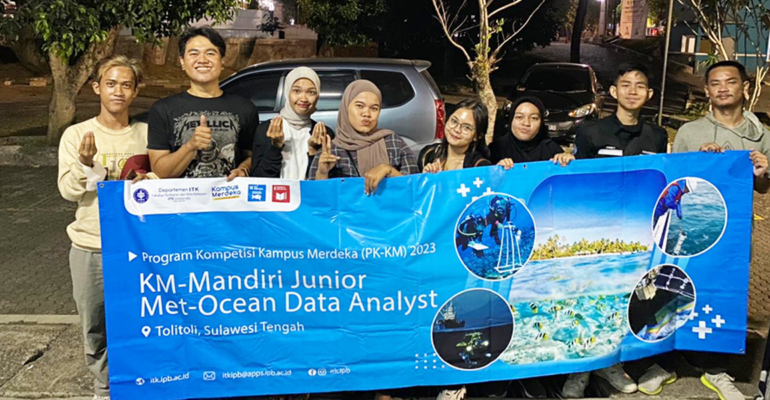IPB Students Mapping Seagrass Distribution with Multispectral Drone in Tolitoli District

The Department of Marine Science and Technology (ITK), Faculty of Fisheries and Marine Science (FPIK) IPB University held the Independent Campus Competition Program (PKKM) batch 2 of the 2022/2023 academic year in Tolitoli Regency, Central Sulawesi.
Slightly different from the previous year, currently the main mission of PKMM Department of ITK IPB University is technology incubation in the form of maritime weather monitoring devices, namely Automatic Weather Station (AWS) which are carried out permanently and patented at each research location.
The IPB University student internship group in Tolitoli District was placed in two villages, Malala Village and Lalos Village. During the activities, students cooperated and partnered with the local village government and the Malala Village Community Supervisory Group (Pokwasmas).
In the first half of the internship, students mapped seagrass areas using multispectral drones, identified and validated them using transects and roll meters, and conducted HPLD tagging at several points in Malala Village.
The chair of the Pokwasmas, Amin, said that in Malala Village there are still many exotic biota, such as dugongs, turtles, endemic fish, or even saltwater crocodiles. “If you want to research dugong, you have to wake up at dawn because dugong look for food in the morning,” he said.
Tolitoli’s marine conditions are still very beautiful. Judging from the vast expanse of seagrass beds, the variety of marine life and the beautiful colors of various coral reefs, Tolitoli is a marine tourism destination and a destination for biota and ecosystem research.
We collected data on seagrass, dugong habitat and researched turtle conservation areas and turtle nesting sites,” said Dwiky, one of the IPB University students, when describing their activities in Tolitoli.
“Malala Village is very beautiful, especially when viewed from above,” said Robubie, also an intern.
In addition, to support the activities of the village community, the majority of whom are fishermen, IPB University students installed AWS at the fishing port of Malala Village in a permanent manner.
The process was assisted by several villagers. Previously, IPB University students also conducted focus group discussions (FGDs) and socialized AWS with the village community.
“This device is used to record and transfer MetOcean data or weather parameters on the coast and sea in real-time so that it can be accessed through the website,” explained Dwiky, one of the IPB University students who participated in the PKKM internship.
Al Imran A Samad, Head of Malala Village is very grateful for the arrival of IPB University students who have provided assistance in the form of weather monitoring equipment. Surely, he said, the tool will be useful for the activities of the Malala Village community because all this time, if they want to go to sea, they only rely on the wind.
“Tolitoli only has one village with AWS, in Lalos Village (near the airport). Now Malala also has one. Hopefully, this can improve shipping safety,” he said.
The village government also hopes that the visit and cooperation with IPB University can continue. If there is research in the future, he hopes that it will be centered on Malala, because Malala has enormous potential that can still be maximized. (*/Rz) (IAAS/MZS)



